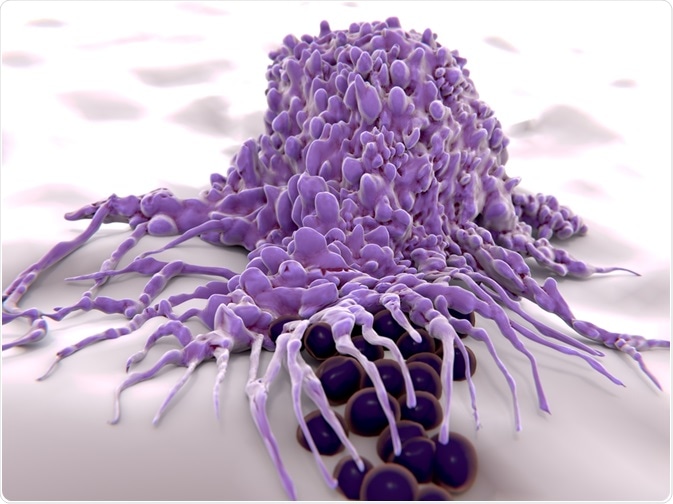Macrophages are a type of leukocyte (white blood cell) that have the ability to engulf and digest cellular debris, microbes, and foreign substances in a process called phagocytosis.

Image Credit: Juan Gaertner/Shutterstock.com
They can do this not only through phagocytosis but also through the secretion of several soluble factors such as chemokines and cytokines. The main function of macrophages is the defense of the body against pathogens.
The most important function of macrophages is to defend the body against pathogens. However, when recruited within neoplastic tissues, tumor-associated macrophages behave paradoxically and do not exert their typical immune function, but rather enhance tumor cell migration, and stimulate angiogenesis.
Role of macrophages in Cancer Initiation and Promotion
Smoldering inflammation, which is low grade without overt clinical consequences, is principally involved in carcinogenesis. It is considered the opposite of 'good' inflammation, which can be helpful for the body to get rid of foreign microorganisms such as bacteria and viruses.
Activated macrophages are essential to smoldering inflammation and work in concert with other immune cells. Pang and colleagues found that reactive nitrogen and oxygen species generated by these immune cells, can produce a mutagenic environment.
Macrophage-derived nitric oxide is considered to be one of the essential mediators of the small molecule chemistry of inflammation, with solid evidence for a role in the cytotoxic and mutagenic mechanisms of the carcinogenic processes.
Role of macrophages as tumors progress to malignancy
Macrophages are required for tumor cell migration and invasion. At the molecular level, tumor cells produce colony-stimulating factor-1 (CSF-1), which induces macrophages to move and synthesize epidermal growth factor (EGF), which in turn induces migration in the tumor cells.
The tumor cells and macrophages go in lockstep, and inhibition of either the EGF or CSF-1 signaling pathways will lead to inhibition of migration and chemotaxis of both cell types.
The extracellular matrix (ECM) has an important role in modifying tumor cell invasiveness. Macrophages produce SPARC/osteonectin, which is pivotal for the deposition of collagen IV, tumor cell invasion, and adhesion to other ECM components. Sangaletti and colleagues found that SPARC/osteonectin is required for spontaneous metastasis from the primary tumor.
Angiogenic switch, which is a significant enhancement of vascular density from the benign-to-malignant transition, is seen in most tumors. Lin and Pollard reported that overexpression of CSF-1 in wild-type mice results in a remarkable early angiogenic switch that in turn speeds the transition to malignancy. These data strongly support that macrophages are major contributors to angiogenic switch.
In most tumors, there does not appear to be a substantial immunological limitation of tumor growth, which suggests that the tumor microenvironment represses any immune response and changes the phenotype to one that promotes the tumor.
The exact role of macrophages in this process has not been fully explained. Recently, phenotyping of the transcriptome of tumor activated macrophages has suggested that they are considered an example of immunological regulatory type, which is characterized by downregulation of transcripts involved with immunological activation such as IL-12, IL-18, and the TLR signaling pathway and upregulation of transcripts detected in alternatively activated macrophages such as arginase.
Macrophages at the metastatic site
In 2009, Qian and colleagues found that macrophages are recruited to the extravasation tumor cells. Removal of these macrophages significantly decreases the extravasation efficiency, and the subsequent tumor cell survival is remarkably diminished.
Furthermore, removal of these recruited macrophages could limit subsequent metastatic growth, even after metastatic lesions had been set up.
Conclusion
During the early phase of a tumor, macrophages initiate an inflammatory environment that is mutagenic and fosters tumor growth.
As tumors progress to malignancy, macrophages induce angiogenesis, promote tumor cell migration and invasion, and repress antitumor immunity. Macrophages are the key that unlocks the gate to allow tumor cells to escape.
At metastatic sites, macrophages make the target tissue ready for incoming tumor cells, and then a separate subpopulation of macrophages enhances tumor cell extravasation, survival, and subsequent growth.
Specialized subpopulations of macrophages may be considered an important novel therapeutic target.
Sources
- Biswas, S. K., Gangi, L., Paul, S., Schioppa, T., Saccani, A., Sironi, M., ... & Vago, L. (2006). A distinct and unique transcriptional program expressed by tumor-associated macrophages (defective NF-κB and enhanced IRF-3/STAT1 activation). Blood, 107(5), 2112-2122.
- Dandekar, R. C., Kingaonkar, A. V., & Dhabekar, G. S. (2011). Role of macrophages in malignancy. Annals of maxillofacial surgery, 1(2), 150.
- Lin, E. Y., & Pollard, J. W. (2007). Tumor-associated macrophages press the angiogenic switch in breast cancer. Cancer Research, 67(11), 5064-5066.
- Ojalvo, L. S., King, W., Cox, D., & Pollard, J. W. (2009). High-density gene expression analysis of tumor-associated macrophages from mouse mammary tumors. The American journal of pathology, 174(3), 1048-1064.
- Pang, B., Zhou, X., Yu, H., Dong, M., Taghizadeh, K., Wishnok, J. S., ... & Dedon, P. C. (2007). Lipid peroxidation dominates the chemistry of DNA adduct formation in a mouse model of inflammation. Carcinogenesis, 28(8), 1807-1813.
- Qian, B. Z., & Pollard, J. W. (2010). Macrophage diversity enhances tumor progression and metastasis. Cell, 141(1), 39-51.
- Qian, B., Deng, Y., Im, J. H., Muschel, R. J., Zou, Y., Li, J., ... & Pollard, J. W. (2009). A distinct macrophage population mediates metastatic breast cancer cell extravasation, establishment, and growth. PloS one, 4(8).
- Sangaletti, S., Di Carlo, E., Gariboldi, S., Miotti, S., Cappetti, B., Parenza, M., ... & Colombo, M. P. (2008). Macrophage-derived SPARC bridges tumor cell-extracellular matrix interactions toward metastasis. Cancer Research, 68(21), 9050-9059.
- Swann, J. B., Vesely, M. D., Silva, A., Sharkey, J., Akira, S., Schreiber, R. D., & Smyth, M. J. (2008). Demonstration of inflammation-induced cancer and cancer immunoediting during primary tumorigenesis. Proceedings of the National Academy of Sciences, 105(2), 652-656.
Further Reading
Last Updated: Feb 25, 2020